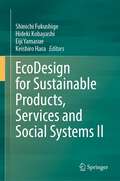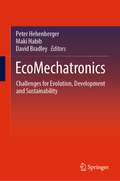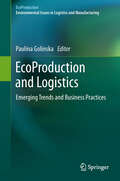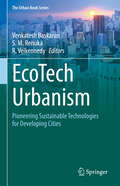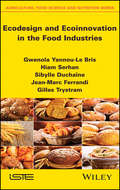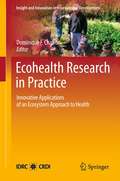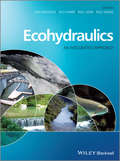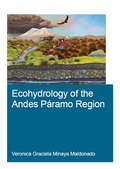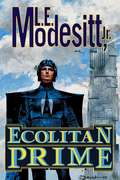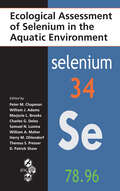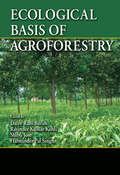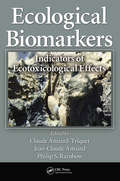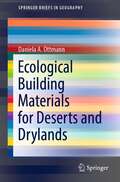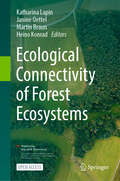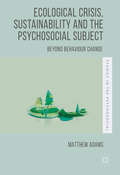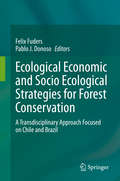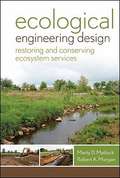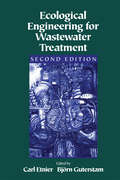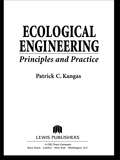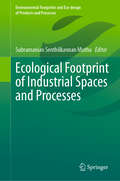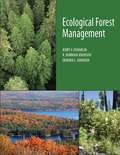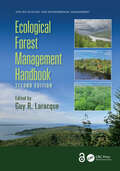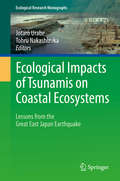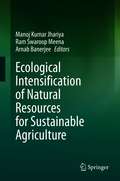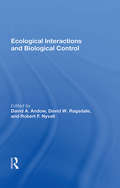- Table View
- List View
EcoDesign for Sustainable Products, Services and Social Systems II
by Shinichi Fukushige Hideki Kobayashi Eiji Yamasue Keishiro HaraThis 2-volume book highlights cutting-edge ecodesign research and covers broad areas ranging from individual product and service design to social system design. It includes business and policy design, circular production, life cycle design and management, digitalization for sustainable manufacturing, user behavior and health, ecodesign of social infrastructure, sustainability education, sustainability indicators, and energy system design. Featuring selected papers presented at EcoDesign 2021: 12th International Symposium on Environmentally Conscious Design and Inverse Manufacturing, it also includes diverse, interdisciplinary approaches to foster ecodesign research and activities. In the context of Sustainable Development Goals (SDGs), in particular SDG 12 (Responsible Consumption and Production), it addresses design innovations for sustainable value creation, considering technological developments, legislation, and consumer lifestyles. Further, the book discusses the conceptof circular economy, which aims to develop circular business models for resource efficient society by taking advantage of digital technologies including artificial intelligence, internet of things, digital twin, data analysis and simulation. Written by experts from academia and industry, Volume 2 focuses on the sustainability assessment of product lifecycle, waste management, material circularity and energy efficiency, food and agriculture, user behavior and health, and transportation. The methods, tools, and practices described are useful for readers to facilitate value creation for sustainability.
EcoMechatronics: Challenges for Evolution, Development and Sustainability
by David Bradley Peter Hehenberger Maki HabibThis book showcases how EcoMechatronics can increase sustainability within engineering and manufacturing. It brings together material from experts in core mechatronics technologies, discussing the challenges related to moving towards more environmentally friendly methods, and presenting numerous case studies and examples of EcoMechatronics oriented applications. The book begins with an introduction to EcoMechatronics in the context of sustainability, before covering core conceptual, technical and design issues associated with EcoMechatronics. It then offers a series of case studies and examples of EcoMechatronics oriented applications and finally, a consideration of the educational issues associated with moving to a new generation of environmentally oriented mechatronic engineers. EcoMechatronics will be of interest to practicing engineers, researchers, system developers. and graduate students in the field of mechatronics and environmental engineering.
EcoProduction and Logistics: Emerging Trends and Business Practices
by Paulina GolinskaEnvironmental awareness is driven mainly by the scarcity of natural resources and by more strict legal regulations. The modern enterprise policy should look at the relations between economic actions and ecological consequences. Ecoproduction is a new business approach which focuses on the most efficient and productive use of raw materials and natural resources in order to minimize footprints on the natural environment. This book aims to provide the state- of- the- art as well as new ideas of the environmental conscious operations management. The contributors present in the individual chapters problems related to: eco-friendly production technologies; recycling and waste reduction. Scope of topics discussed in this book covers also pollution prevention, energy efficiency. The authors describe problems of information management in complex systems
EcoTech Urbanism: Pioneering Sustainable Technologies for Developing Cities (The Urban Book Series)
by Venkatesh Baskaran S. M. Renuka R. VelkennedyIn a world experiencing unprecedented urbanization and drastic climate change, there is immense demand for creative solutions to the environmental, social, and economic obstacles faced by burgeoning cities in the developing world. This book delves into the potential of innovative urban initiatives to address the challenges of urbanization in countries with limited resources, thereby contributing to sustainable and inclusive urban development. It explores how cutting-edge technologies can provide efficient functionality for urban residents through information and communications shared among stakeholders. The primary aim is to enhance the efficiency of urban operations, foster economic development, and improve the well-being of residents by leveraging intelligent technologies and analyzing data. Government and policy are recognized as fundamental drivers of urban development, and the book sheds light on initiatives supporting cities that are not only technologically advanced but also sustainable, inclusive, and equitable. Contributions provide insight into technological aspects of urbanism, including the Internet of Things (IoT), sensors, data analytics, and essential infrastructure for sustainable city development. They also emphasize the importance of community engagement and inclusivity, stressing that urban initiatives should be designed for the benefit of all citizens, leaving no one behind. EcoTech Urbanism makes a compelling case for the imperative of sustainability in the future of urban areas, underscoring the critical role of technology in achieving this goal. The book offers a holistic perspective on the integration of eco-friendly technologies, fostering a balance between urban development and environmental conservation, ultimately paving the way for a future where cities thrive sustainably and inclusively.
Ecodesign and Ecoinnovation in the Food Industries
by Gwenola Yannou-Le Bris Hiam Serhan Sibylle Duchaine Jean-Marc Ferrandi Gilles TrystramInnovations of agri-food systems during the last 50 years have been guided by a globalized agro-industrial paradigm, which has contributed to climate change, degradation of natural resources, soil depletion, social inequalities, loss of biodiversity and various food-related health problems. Despite the increasing emphasis of food policies and research to address these issues with ecologically sustainable innovations, there are still no studies that explain how to utilize and integrate ecodesign practices in food products development in a world of finite resources. This book explains how to employ ecodesign in business models to address the economic, social, environmental, and nutritional problems that face the world's food systems. The lessons of the ÉcoTrophélia project ? a unique program implemented by a group of European agricultural higher education institutions to involve students in designing and developing food ecoinnovation projects ? are explored. Through an analysis of these projects, the authors describe the tools, methods and standards that were developed to institute ecodesign into the business models of 11 ecologically-friendly food products. This book provides operational good practices that can be implemented in educational programs and agri-food industries, to orient learning and practices towards greater sustainability.
Ecohealth Research in Practice
by Dominique F. CharronThis book is about doing innovative research to achieve sustainable and equitable change in people's health and well-being through improved interactions with the environment. It presents experiences from the field of ecosystem approaches to health (or ecohealth research) and some insights and lessons learned. It builds on previous literature, notably Forget (1997), Forget and Lebel (2001), Lebel (2003), and Waltner-Toews et al. (2008). Through case-studies and other contributions by researchers supported by Canada's International Development Research Centre (IDRC), the book presents evidence of real changes in conditions of people, their health, and the ecosystems that support them. These changes were derived from applications of an ecosystem approach to health in developing regions of the world. The book also illustrates the resulting body of applied, participatory, and action research that improved health and environmental management in developing countries and, in many cases, influenced policies and practices.
Ecohydraulics
by Paul Kemp Paul J. Wood Atle Harby Ian MaddockEcohydraulics: An Integrated Approachprovides a research level text which highlights recent developments of this emerging and expanding field. With a focus on interdisciplinary research the text examines:-the evolution and scope of ecohydraulicsinteractions between hydraulics, hydrology, fluvial geomorphology and aquatic ecologythe application of habitat modelling in ecohydraulic studiesstate of the art methodological developments and approachesdetailed case studies including fish passage design and the management of environmental flow regimesresearch needs and the future of ecohydraulics researchThe contributions offer broad geographic coverage to encapsulate the wide range of approaches, case studies and methods used to conduct ecohydraulics research. The book considers a range of spatial and temporal scales of relevance and aquatic organisms ranging from algae and macrophytes to macroinvertebrates and fish. River management and restoration are also considered in detail, making this volume of direct relevance to those concerned with cutting edge research and its application for water resource management.Aimed at academics and postgraduate researchers in departments of physical geography, earth sciences, environmental science, environmental management, civil engineering, biology, zoology, botany and ecology; Ecohydraulics: An Integrated Approach will be of direct relevance to academics, researchers and professionals working in environmental research organisations, national agencies and consultancies.
Ecohydrology of the Andes Páramo Region (IHE Delft PhD Thesis Series)
by Veronica G. Minaya MaldonadoIn the Andes mountainous region of South America grasslands known as páramos provide important ecosystem services like sustaining biodiversity, securing carbon sequestration and providing water storage. However, many páramos regions are subject to land use change due to expanding agriculture, intensified grazing and land burning. These are usually caused by socio-economic factors driving local communities to increase their income generation. Trying to achieve a better understanding of the páramos is often restricted to exploring specific details and does not follow an integrated approach or a comprehensive ecosystem analysis. In this research the focus is on better understanding the dominant ecohydrological processes and their interactions. An integrated approach is followed using in-situ measurements, field experiments, laboratory analyses, and numerical modelling. Also, different hydroinformatics tools are used to identify and quantify the ecosystem services provided by the páramos. Moreover, a framework is developed that allows a more realistic quantification and mapping of the main ecosystem services. The approach was carried out for a test site in an Ecological area in North Ecuador. The findings show a clear difference in ecosystem services depending on their altitudinal range and type of vegetation. These results can be used to further develop environmental management and landscape planning strategies, in order to better meet the social goals. This research is aligned with the priorities advocated in the IPCC Report (2007) 'to improve representation of the interactive coupling between ecosystems and the climate system', and with SDG #15: Life on Land 'By 2020, ensure the conservation, restoration and sustainable use of terrestrial and inland freshwater ecosystems and their services'.
Ecolitan Prime: The Ecologic Envoy and The Ecolitan Enigma
by L. E. Modesitt Jr.This new omnibus from L. E. Modesitt, Jr., includes the third and fourth of his four- volume Ecolitan series, The Ecologic Envoy and The Ecolitan Enigma, both starring Nathaniel Whaler.Four hundred years after winning secession from the Terran Empire (as chronicled in the earlier omnibus, Empire & Ecolitan), the star system Accord wants to sign a simple trade treaty with the Empire on microchip export tariffs. But if the agreement is so minor, why is Professor Nathaniel Whaler, chief economist at the Ecolitan Institute and his world's top commando killer, chosen as Accord's Envoy? Because the Imperial capital is a maddening bureaucracy of sniveling diplomats, high-profile figureheads, powers behind the throne, and spies---everywhere, spies. So the Envoy has to face red tape, politics, prejudice, as well as and a gauntlet of kidnappers, assassins, snipers, and bombs. And some ministry---but which?---doesn't want the treaty. In fact, some in the Empire still blame Accord for Earth's poisoning and for the defection of fifty star systems after the war between Imperial nuclear might and Ecolitan bio-ecological weaponry. A hidden cabal wants to fight that war again---even if, this time, the entire galaxy dies. And only Nathaniel Whaler, the Ecologic Envoy, has the power to stop the catastrophe. This omnibus concludes one of L. E. Modesitt's most powerful science fiction series.A shocking novel of what could happen if the fanatical defense of the environment crossed the line into deadly terror. When environmental consultant Jack McDarvid's boss is killed in a shootout near the Capitol, McDarvid becomes enmeshed in a diabolical plot behind the scenes of the environmental movement.Other Series by L.E. Modesitt, Jr.The Saga of RecluceThe Imager PortfolioThe Corean ChroniclesThe Spellsong CycleThe Ghost BooksThe Ecolitan MatterThe Forever HeroTimegod's WorldOther BooksThe Green ProgressionHammer of DarknessThe Parafaith WarAdiamanteGravity DreamsThe Octagonal RavenArchform: BeautyThe Ethos EffectFlashThe Eternity ArtifactThe Elysium CommissionViewpoints CriticalHazeEmpress of EternityThe One-Eyed ManSolar ExpressAt the Publisher's request, this title is being sold without Digital Rights Management Software (DRM) applied.
Ecological Assessment of Selenium in the Aquatic Environment
by William J. Adams Peter M. Chapman Marjorie L. Brooks Charles G. Delos Samuel N. Luoma William A. Maher Harry M. Ohlendorf Theresa S. Presser D. Patrick ShawBased on the work and contributions of 46 scientists, managers, and policymakers, Ecological Assessment of Selenium in the Aquatic Environment documents the state of the science and explores how to use this information when assessing and managing the environmental effects of Se. A focused discussion on the fate and effects of Se in aquatic ecosyste
Ecological Basis of Agroforestry
by Shibu Jose Ravinder Kumar Kohli Harminder Pal Singh Daizy Rani BatishFaced with the growing problems of climate change, ecosystem degradation, declining agricultural productivity, and uncertain food security, modern agricultural scientists look for potential relief in an ancient practice. Agroforestry, if properly designed, can mitigate greenhouse effects, maintain ecosystem health and biodiversity, provide food sec
Ecological Biomarkers: Indicators of Ecotoxicological Effects
by Philip S. Rainbow Jean-Claude Amiard Claude Amiard-TriquetDoes a change, which affects a few biological macro-molecules, some cells, or a few individuals within a population, have any ecological significance that would allow the prediction of deleterious effects at higher levels of biological organization, namely the population, community, and ultimately the ecosystem? With contributions from experts in t
Ecological Building Materials for Deserts and Drylands (SpringerBriefs in Geography)
by Daniela A. OttmannThis book examines prospective climate adaptive building materials in desert and drylands in the context of climate change, desertification, urbanisation demands, and the consequent sustainable urban development challenges. This preliminary collection of ecological materials covers the characterisation of biotic and abiotic resources for materials, their specifications and benefits for adequate bio-climatic design and construction. Particular emphasis is given to ecological composite materials for advances in desert architecture. Based on the initial collection, the book culminates with potentials for new ecological building materials. The "eComposite Combinator" matrix offers potential research recipes and encourages the reader to conduct further climate-matters related research.
Ecological Connectivity of Forest Ecosystems
by Martin Braun Katharina Lapin Janine Oettel Heino KonradThis is an open access book. This professional volume provides scientific background and practical guidance on forest management in light of ecological connectivity. Readers will gain a great understanding of shifting species in response to climate change and the resulting loss of various resources. The main drivers of these variations are the quality of the availability, quantity, and quality of habitats in the landscape, the genetic diversity of species populations, and the ability to navigate through a fragmented landscape matrix. The connectivity of habitats is gaining importance in the combat of both, the biodiversity crisis and the climate change crisis. Improving ecological connectivity, however, does not automatically benefit all species, as the examples described in the book demonstrate. Specific planning tools, active monitoring protocols, and management measures are needed to increase the benefit for species with low dispersal and small population size, which generally fail to migrate. Assisted migration can help to prevent species extinction, but also offer opportunities for pathogens to cross geographical barriers. The vast majority of the known diversity of plants, fungi, vertebrates, and invertebrates depends on forest ecosystems. This volume helps to spread this message and prepare students for their later careers in the forestry sector, while also informing active practitioners and policy makers.
Ecological Crisis, Sustainability and the Psychosocial Subject
by Matthew AdamsThis book draws on recent developments across a range of perspectives including psychoanalysis, narrative studies, social practice theory, posthumanism and trans-species psychology, to establish a radical psychosocial alternative to mainstream understanding of 'environmental problems'. Only by addressing the psychological and social structures maintaining unsustainable societies might we glimpse the possibility of genuinely sustainable future. The challenges posed by the reality of human-caused 'environmental problems' are unprecedented. Understanding how we respond to knowledge of these problems is vital if we are to have a hope of meeting this challenge. Psychology and the social sciences have been drafted in to further this understanding, and inform interventions encouraging sustainable behaviour. However, to date, much of psychology has appeared happy to tinker with individual behaviour change, or encourage minor modifications in the social environment aimed at 'nudging' individual behaviour. As the ecological crisis deepens, it is increasingly recognised that mainstream understandings and interventions are inadequate to the collective threat posed by climate change and related ecological crises.
Ecological Economic and Socio Ecological Strategies for Forest Conservation: A Transdisciplinary Approach Focused on Chile and Brazil
by Felix Fuders Pablo J. DonosoThis book proposes strategies for improving the resilience and conservation of temperate forests in South America, such that these forests can provide ecosystem services in a sustainable way. As such it contributes to the design of a resilient human-forest model that takes into account the multiculturalism of local communities, in many cases including aspects of ecological economics, development economics and territorial development planning that are related to indigenous peoples or first nations. Further, it provides proposals for public and territorial policies that improve the state of conservation of native forests and forest ecosystems, based on a critical analysis of the economic factors that lead to the degradation of forest ecosystems in South America today. This edition was conceived by members of the Transdisciplinary Research Center for Social and Ecological Strategies for Sustainable Forest Management in South America at the Universidad Austral de Chile. It includes contributions by distinguished researchers from around the world, combining the fields of economics, ecology, biology, anthropology, sociology and statistics. It is not, however, simply a collection of works written by authors from different disciplines, but rather each chapter is in itself transdisciplinary. This approach makes the book a unique contribution to enhancing social, managerial and political approaches to forestry management, helping to protect forest ecosystem services and make them more sustainable. This, in turn, will benefit local communities and society as a whole, by reducing the negative externalities of forestry management and enhancing future opportunities.
Ecological Engineering Design
by Robert A. Morgan Marty D. MatlockEcologically-sensitive building and landscape design is a broad, intrinsically interdisciplinary field. Existing books independently cover narrow aspects of ecological design in depth (hydrology, ecosystems, soils, flora and fauna, etc. ), but none of these books can boast of the integrated approach taken by this one. Drawing on the experience of the authors, this book begins to define explicit design methods for integrating consideration of ecosystem processes and services into every facet of land use design, management, and policy. The approach is to provide a prescriptive approach to ecosystem design based upon ecological engineering principles and practices. This book will include a novel collection of design methods for the non-built and built environments, linking landscape design explicitly to ecosystem services.
Ecological Engineering for Wastewater Treatment
by Carl Etnier Bjorn GuterstamThe new science of ecological engineering is winning increasing acceptance all over the world. Established industrial economies like Sweden and the United States are investing more in it as initial skepticism and regulatory hurdles are giving way to burgeoning investments by companies and municipalities, increased research activity, and great inter
Ecological Engineering: Principles and Practice
by Patrick C. KangasLess expensive and more environmentally appropriate than conventional engineering approaches, constructed ecosystems are a promising technology for environmental problem solving. Undergraduates, graduate students, and working professionals need an introductory text that details the biology and ecology of this rapidly developing discipline, known as
Ecological Footprint of Industrial Spaces and Processes (Environmental Footprints and Eco-design of Products and Processes)
by Subramanian Senthilkannan MuthuThis book describes and offers cases in the assessment of Ecological Footprint (EF) in different industrial spaces and processes. Ecological Footprint is a useful metric that measures the level of resources from the environment that are required to support a specific way of life or business. This book enumerates the concept of EF and how this concept can be applied to a variety of industrial spaces and processes including textile manufacture, electric vehicle charging, construction materials, and agriculture.
Ecological Forest Management
by Jerry F. Franklin K. Norman Johnson Debora L. JohnsonFundamental changes have occurred in all aspects of forestry over the last 50 years, including the underlying science, societal expectations of forests and their management, and the evolution of a globalized economy. This textbook is an effort to comprehensively integrate this new knowledge of forest ecosystems and human concerns and needs into a management philosophy that is applicable to the vast majority of global forest lands. Ecological forest management (EFM) is focused on policies and practices that maintain the integrity of forest ecosystems while achieving environmental, economic, and cultural goals of human societies. EFM uses natural ecological models as its basis contrasting it with modern production forestry, which is based on agronomic models and constrained by required return-on-investment. The book concludes with an overview of how EFM can contribute to resolving major 21st century issues in forestry, including sustaining forest dependent societies.
Ecological Forest Management Handbook (Applied Ecology and Environmental Management)
by Guy R. LarocqueThe second edition of Ecological Forest Management Handbook continues to provide forestry professionals and students with basic principles of ecological forest management and their applications at regional and site-specific levels. Thoroughly updated and revised, the handbook addresses numerous topics and explains that ecological forest management is a complex process that requires broad ecological knowledge. It discusses how to develop adaptive management scenarios to harvest resources in a sustainable way and provide ecosystem services and social functions. It includes new studies on ecological indicators, the carbon cycle, and ecosystem simulation models for various forest types: boreal, temperate, and tropical forests.NEW IN THE SECOND EDITION Provides a comprehensive collection of sustainable forest management principles and their applications Covers new ecological indicators that can be applied to address forest environmental issues Includes all types of models: empirical, gap, and process-based models Explains several basic ecological and management concepts in a clear, easy-to- understand manner This handbook is intended for researchers, academics, professionals, and undergraduate and graduate students studying and/or involved in the management of forest ecosystems.Chapters 16 and 18 of this book are available for free in PDF format as Open Access from the individual product page at www.taylorfrancis.com. They have been made available under a Creative Commons Attribution-Non Commercial-No Derivatives 4.0 license.
Ecological Impacts of Tsunamis on Coastal Ecosystems
by Tohru Nakashizuka Jotaro UrabeThis book focuses on the ecological impacts of the Great East Japan Earthquake and resulting tsunamis, a rare and extremely large disturbance event, on various coastal ecosystems in Japan's Tohoku area, including sub-tidal and tidal animal communities, sand dune plant communities and coastal forests. The studies presented here describe not only how species and populations in these ecosystems were disturbed by the earthquake and tsunamis, but also how the communities have responded to the event and what types of anthropogenic activities will hamper their recovery processes. In the ecological sciences, it is often argued that large disturbances are critical to shaping community structures and biodiversity in local and regional habitats. However, our understanding of these roles remains limited, simply because there have been few opportunities to examine and address the ecological impacts of large disturbance events. The scale of the 2011 Great East Japan Earthquake makes it one of the largest hazards in the past 1000 years. Thus, this book provides a unique opportunity to advance our understanding of the ecological impacts of large and rare disturbances and the implications of these events in the conservation and management of coastal ecosystems. Following an outline of the Great East Japan Earthquake, the book's content is divided into two major parts. Part I reports on studies examining the ecological impacts of the tsunamis on sub-tidal and tidal animal communities, while Part II focuses on terrestrial plant communities in Japan's coastal Tohoku area. This book will benefit all scientists interested in the ecological impacts of large disturbances on aquatic and terrestrial ecosystems in general, and especially those who are interested in the ecological management of coastal ecosystems and Ecosystem based Disaster Risk Reduction (EcoDRR).
Ecological Intensification of Natural Resources for Sustainable Agriculture
by Ram Swaroop Meena Manoj Kumar Jhariya Arnab BanerjeeEcological intensification involves using natural resources such as land, water, soil nutrients, and other biotic and abiotic variables in a sustainable way to achieve high performance and efficiency in agricultural yield with minimal damage to the agroecosystems. With increasing food demand there is high pressure on agricultural systems. The concept of ecological intensification presents the mechanisms of ensuring high agricultural productivity by restoration the soil health and landscape ecosystem services. The approach involves the replacement of anthropogenic inputs with eco-friendly and sustainable alternates. Effective ecological intensification requires an understanding of ecosystems services, ecosystem's components, and flow of resources in the agroecosystems. Also, awareness of land use patterns, socio-economic factors, and needs of the farmer community plays a crucial role. It is therefore essential to understand the interaction of ecosystem constituents within the extensive agricultural landscape. The editors critically examined the status of ecological stress in agroecosystems and address the issue of ecological intensification for natural resources management. Drawing upon research and examples from around the world, the book is offering an up-to-date account, and insight into the approaches that can be put in practice for poly-cropping systems and landscape-scale management to increase the stability of agricultural production systems to achieve ‘Ecological resilience’. It further discusses the role of farmer communities and the importance of their awareness about the issues. This book will be of interest to teachers, researchers, climate change scientists, capacity builders, and policymakers. Also, the book serves as additional reading material for undergraduate and graduate students of agriculture, forestry, ecology, agronomy, soil science, and environmental sciences. National and international agricultural scientists, policymakers will also find this to be a useful read for green future.
Ecological Interactions And Biological Control
by David A. Andow David W. Ragsdale Robert F. NyvallRecent interest in nonchemical methods of pest control has brought renewed attention to the biological control of plant pests in the fields of entomology, plant pathology, and weed science. Ecological Interactions and Biological Control addresses issues of theory and practice common to all three fields. Focusing on systems rather than on individual
